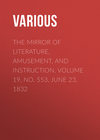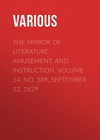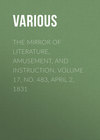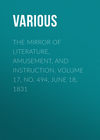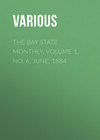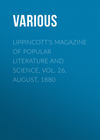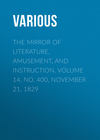Czytaj książkę: «The Mirror of Literature, Amusement, and Instruction. Volume 19, No. 553, June 23, 1832», strona 4
"I can hardly judge at present, but I don't think Arlington's suit will prosper, and you will laugh when I tell you why: it is not that the youth is too shy and the maiden too cold; it is not the officiousness of the Berwicks;—it is because Lord Arlington has some thirty or forty thousand a-year. He is so rich, and the Rochdales so poor, and so stiffly disinterested withal; and it is such a mortal sin to think of money in this dirty world, where we cannot live without it, that they actually discourage him, and make it a point of honour to snub him daily, to prove their superiority to mercenary considerations. What weak things your strong-minded people sometimes do! and what horrors arise from acting upon principle! I, who have none, fancy I sometimes stumble into right by just doing what I please, and letting others do the same.
"Pray be bountiful, and send me some news, true or false—only if the latter, tell me the inventors. I have had nothing of the kind save a letter from Neville, full of comfortable lies, which I have already re-told, and now dearth is staring us in the face—not five minutes consumption in the house—and we are reduced to talk about each other, Berwick excepted, who falls back upon himself, and tells one again and again the 'very good thing' he said ten years ago. Tell me something about your intimates—what are their high mightinesses, Ladies Crawford and Cheadle, now doing for the edification of the world? Has the former forgiven his Majesty of –? or is she brouillée with any other potentate! Has the latter made peace with the Cabinet? or are Ministers still doomed to exclusion from her parties unless they will be good boys, and do as she bids them? and is she still chattering party gossip, and thinks all the while she is talking politics? Send me our dear friend's last silly thing; and if you don't know which is the last, do, pray do, go to her house and gather one.
"I know nothing of Beauchamp but that he is now in Scotland, chin-deep in heather, killing grouse against time for a bet of some hundreds, which he has persuaded some simpleton to make with him. No man knows better than Beauchamp how to get paid for amusing himself. I had never heard, and don't believe, that Beauchamp is going to take a wife. Whatever you know of this, pray tell me; and say whose wife—not Sir Robert Ridware's, I hope; that would be so illiberal, and so unnecessary! I hate monopolies; and, moreover, I have always admired, the example of the poet Thomson, who ate his peaches off the tree. Forgive this pedantry, and any other sins in my letter; or if you are to scold me, let it be in person. Addio! fair lady. Yours,—not unalterably, for that is tiresome,—but as long as it pleaseth you.
"G.D."
A pleasant anecdote follows, by Sir James Berwick, "a busy, meddling, vain, good-humoured man, whose chief ambition it was to be considered thoroughly 'a man of the world,' and 'a good member of society.'"
"I was asked to dine with a Sir Dixie Hickson, a stiff, bluff, beef-eating sort of man, who was under some obligation to me, or I to him, I don't know which. Well, I forgot name, residence all but the day—came home in a hurry, looked into the Court Guide, found a Sir Hicks Dixon, drove to his house, found a party assembled, bowed to a fat woman in a turban who sailed forward â la maitresse de maison, and simpered an apology, for Sir Hicks', or Sir Dicks', or whatever he might be, 'unavoidable absence;' I forget why, 'but did not like to put off the party, and hoped to look in in the evening.' (Mind I had never seen the femme Hickson.) Down we went to dinner; a guest had failed, so there was a place for me; did not know a soul of the party; such a set of creatures were never before assembled on God's earth! Well, I ate, drank, and talked with the savages, told them some of my best lies, and was growing immensely popular, when in drops Sir Hicks from the country. You should have seen us! we set each other like two pointers backing in a stubble, with a covey between them, while the femme Dixon kept fussing with an introduction—'Sir Hicks, Sir James,—Sir James, Sir Hicks!' At last the light broke in, and I explained, and we laughed about it for a whole hour. I was afraid when all was over I should have had to pay my debt of dinner to Sir Dixie; but the best of it is, I have not seen or heard more of either him or Sir Hicks. It would have served me right if they had asked me to dinner once a week for ever visiting such people. It is not likely that you should know them."
There is much truth in the following satire upon fashionable travelling; though persons of fashion are not the only unimproved tourists. In travelling, a man must carry half the entertainment along with him.
"'Listen,' said he, 'and you will hear more of the uses and advantages of travel.'
"Mr. Theobald at that instant was speaking to Lord Bolsover.
"'I will just tell you what I did. Brussels, Frankfort, Berlin, Vienna, Munich, Milan, Naples and Paris; and all that in two months. No man has ever done it in less.'
"'That's a fast thing; but I think I could have done it,' said Lord Bolsover, 'with a good courier. I had a fellow once, who could ride a hundred miles a day for a fortnight.'
"'I came from Vienna to Calais,' said young Leighton, 'in less time than the Government courier. No other Englishman ever did that.'
"'Hem! I am not sure of that,' said Lord Bolsover; 'but I'll just tell you what I have done—from Rome to Naples in nineteen hours; a fact, upon my honour—and from Naples to Paris in six days.'
"'Partly by sea?'
"'No! all by land;' replied Lord Bolsover, with a look of proud satisfaction.
"'I'll just tell you what I did,' Mr. Leighton chimed in again, 'and I think it is a devilish good plan—it shows what one can do. I went straight an end, as fast as I could, to what was to be the end of my journey. This was Sicily; so straight away I went there at the devil's own rate, and never stopped any where by the way; changed horses at Rome and all those places, and landed in safety in – I forget exactly how long from the time of starting, but I have got it down to an odd minute. As for the places I left behind, I saw them all on my way back, except the Rhine, and I steamed down that in the nighttime.'
"'I have travelled a good deal by night,' said Theobald. 'With a dormeuse and travelling lamp I think it is pleasant, and a good plan of getting on.'
"'And you can honestly say, I suppose,' said Denbigh, 'that you have slept successfully through as much fine country as any man living?'
"'Oh, I did see the country—that is, all that was worth seeing. My courier knew all about that, and used to stop and wake me whenever we came to any thing remarkable. Gad! I have reason to remember it, too, for I caught an infernal bad cold one night when I turned out by lamp-light to look at a waterfall. I never looked at another.'"
SCRIPTURAL ANTIQUITIES
We resume our quotations from this treasurable little volume already noticed in No. 551, of The Mirror. Taken altogether, it is an exhaustless mine of research upon subjects which have awakened curiosity from childhood to old age—from the little wonder-struck learner on the school form to the patient inquirer with spectacle on nose.
The Raven and the Dove at the Deluge.
"We shall quote the interesting account which the Sacred Volume supplies us, of the singular messenger employed by the patriarch, to procure information as to the state of the diluvial waters;—'And it came to pass at the end of forty days, that Noah opened the window of the ark which he had made: and he sent forth a raven, which went to and fro (in going forth and returning), until the waters were dried up from off the earth. Also, he sent forth a dove from him to see if the waters were abated from off the face of the ground: but the dove found no rest for the sole of her foot, and she returned unto him into the ark: for the waters were on the face of the whole earth. Then he put forth his hand, and took her and pulled her (caused her to come) in unto him into the ark. And he stayed yet other seven days, and again he sent forth the dove out of the ark: and the dove came into him in the evening; and lo! in her mouth was an olive leaf, plucked off. So Noah knew that the waters were abated from off the earth. And he stayed yet other seven days, and sent forth the dove which returned not again unto him any more.' This narrative, though simple in its style, is expressive and beautiful. There is an eloquent charm which, while it touches the chords of truth, makes the heart respond to the tale. The raven would find sufficient for its carnivorous appetite in the floatage of the animal remains, on the briny flood, and would return to roost on the ark; but it was far different with Noah's bird, so long as the waters prevailed, there could be no pause for her weary wing, and the messenger would return to the ark. So soon, however, as the subsidence of the waters had permitted the olive to emerge, a sprig was plucked off, and borne to the patriarch in triumph. Emphatic symbol of peace! Commemorated through ages, it is still the symbol of peace. Along with the fig tree and vine, it is associated, as the emblem of man's inheritance, and in the geography of its locality, the patriarch would hail the plain on which it flourished, and from which it was borne, as the place of his former abode. The dove would return, though the olive had emerged, because no food had as yet been provided. How long this ambassador of peace was absent, we cannot tell: we are only informed that the dove returned in the evening. If the winged messenger was despatched early in the day, it is not improbable that the delightful trophy was obtained from Mount Olivet, where, according to the late Dr. Clarke, 'the olive still vindicates its parental soil.' In considering the question of the geographical distribution of plants, this would likely be the nearest olive plane from the mountains of Armenia. It may be remarked also, that the olive remarkably synchronizes with the habits of the dove; since, according to Dr. Chandler, in his Travels in Greece, as soon as the olive matures its berries, vast numbers of doves, among other birds, repair for food to the olive groves. It cannot be irrelevant to remind our readers of the habits of the columba tabellaria, or the carrier pigeon, so called from the office to which it has been applied, viz. that of carrying letters, in the Levant, &c. Those of Mesopotamia are the most famous in the world, and the Babylonian carrier pigeon is employed even on ordinary occasions at Bagdad. The geographical locality, therefore, of the carrier pigeon, it is interesting to remember, is in the vicinity of those very mountains where the ark finally rested. With us the carrier pigeon is an exotic, and is now acclimated, or naturalized. Carrier pigeons fly at the rate of fifty miles an hour.—'Napoleon,' the name of one of the carrier pigeons which was despatched from London a short time ago, at four o'clock A.M., reached Liege, in France, about ten o'clock in the day. Mr. Audubon states his having shot the passenger pigeon (columba migratoria) in America, and found in its stomach, rice, which could not have been obtained within a distance of eight hundred miles."
Parable of the Good Samaritan.
"Our readers will remember the beautiful parable of the good Samaritan, and his kindness and compassion for the wounded stranger 'who fell among thieves,' on his journey from Jerusalem to Jericho. Sichem or Sychar, the district of the Samaritans, and which they now inhabit, is about forty miles from Jerusalem. Jericho is about nineteen miles from the capital of Judea; and, as it was in the first century, so the intervening country still remains infested by banditti. Sir Frederick Henniker, as late as 1820, on his journey from Jerusalem to Jericho, was way-laid, attacked by a band of predatory Arabs, and plundered. He was stripped naked, and left severely wounded; and in this state was carried to Jericho."
David and Goliath.
"David's encounter with Goliath, the champion of the Philistines, is mentioned in I Samuel xvii.: and in the 40th verse is described the simple armour with which the shepherd boy, Jesse's son, repaired to the contest. Many a thirsty pilgrim, as he passes through the valley of Eluh, on the road from Bethlehem to Jaffa (Joppa), has drunk of 'the brook in the way'—that very brook from whence the minstrel youth 'chose him five smooth stones.' 'Its present appearance,' says a recent traveller, 'answers exactly to the description given in Scripture; the two hills on which the armies stood, entirely confined it on the right and left. The valley is not above half a mile broad. Tradition was not required to identify this spot. Nature has stamped it with everlasting features of truth. The brook still flows through it in a winding course, from which David took the smooth stones.'"
